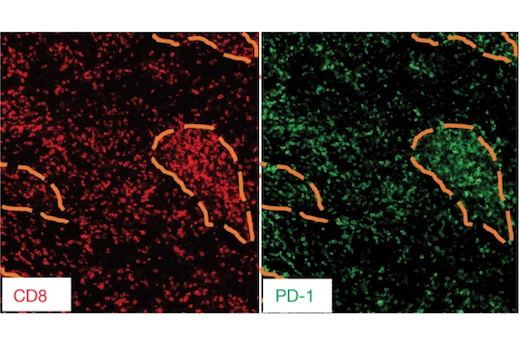The immune cells that are the major targets of immune checkpoint inhibitors are present in tumors from head and neck cancer patients, a new study from scientists at Emory Vaccine Center and Winship Cancer Institute of Emory University reports.
The study focuses on head and neck tumors that are positive for human papillomavirus (HPV), which is becoming one of most common types of head and neck cancers treated in the Western world. The results were published on Sept. 1 in Nature.
It suggests checkpoint inhibitors, which have transformed the treatment of several types of cancer, could be uniquely effective against this type of head and neck cancer. The results also indicate that the experimental approach of therapeutic vaccination for HPV+ cancer could be broadened to include more elements of the virus, to potentially trigger a broader and stronger immune response.
Researchers from Rafi Ahmed’s lab at Emory Vaccine Center collaborated with the co-directors of the Winship Head and Neck Cancers Working Group, oncologists Nabil Saba, MD and Mihir Patel, MD, to obtain samples from patients with head and neck tumors early in the course of treatment.
“About five years ago, we began to have an influx of patients that sought out our center for surgical treatment,” Patel says. “We often heard some variation of a similar story: I was sick with cold-like symptoms and once that resolved this I noticed swelling in a lymph node on the side of my neck. Stories like this made us think about how the immune system might play a unique role, different than typical smoking-related head and neck cancers.”
The team wanted to learn more about the different kinds of CD8 or “killer” T cells present within the cancers; CD8 T cells are specialized immune cells capable of detecting and killing virus-infected or tumor cells, if they are not constrained by regulatory signals.
The inhibitory receptor PD-1 is highly expressed on exhausted CD8 T cells in chronic viral infections and cancer, and past research has shown that stem-like PD-1+ CD8 T cells are crucial for maintaining tumor-specific CD8 T cell responses. The majority of currently available checkpoint inhibitors, such as pembrolizumab and nivolumab, block the PD-1 signaling pathway.
“Our results show that a subset of HPV-specific CD8 T cells in the tumor exhibits a striking resemblance to the stem-like CD8 T cells our lab has previously defined in mouse models as proliferating in response to PD-1 blockade,” says Andreas Wieland, PhD, co-lead author of the paper and an instructor in Ahmed’s lab.
“It is reasonable to assume that these cells would similarly provide a proliferative burst in response to PD-1 blockade in these patients. However, this remains to be formally tested.”
HPV-positive tumors do have a relatively good response to conventional forms of treatment such as radiation and chemotherapy, Wieland adds. The group of patients studied at Winship was treatment-naïve when tumor samples were obtained; how radiation and chemotherapy affect the number and phenotype of T cells in the tumor needs additional investigation.
“These findings greatly enhance our understanding of CD8 T cell responses in the tumor micro-environment in HPV-related oropharynx cancers, and likely other virally mediated tumors,” Saba says. “It confirms the existence of the different lineages necessary for an effective T cell specific anti-tumor response. Taking advantage of the local immune-response by avoiding its possible early elimination by traditional therapeutic modalities may pave the way to an improved clinical outcome for patients. It may have implications for how best to incorporate immunotherapy in the treatment of other virally mediated tumors.”
“We now have an inclination that incorporating immune therapy with PD-1 blockade prior to surgery or radiation may benefit patients,” Patel says. “We are actively in the process of developing ‘window of opportunity’ studies to understand this.
Looking at both primary tumors and metastatic lymph nodes, the researchers were able to detect both tumor-specific stem-like CD8 T cells, which can proliferate in response to HPV peptides, and more terminally differentiated cells that do not proliferate. In contrast to significant numbers of tumor-specific CD8 T cells in the tumors, tumor-specific cells appeared at a very low abundance in patients’ blood, suggesting that they preferentially reside in tumors. The team also found that the different CD8 T cell subsets in the tumor microenvironment differ in their localization, with stem-like cells residing in distinct niches within the stroma and away from the tumor cells themselves.
Concentrating on HPV-positive tumors in this study facilitated the study of tumor-specific T cells with defined specificities across several patients as the virus is providing a defined set of tumor-associated antigens, whereas in other types of cancer the antigens caused by mutations will vary from individual to individual.
Co-first authors of the paper are Haydn Kissick, PhD, assistant professor of urology and microbiology and immunology, and Christiane Eberhardt, MD, a former postdoctoral fellow in Ahmed’s lab who is now at the University of Geneva. Patel is also associate professor of otolaryngology at Emory University School of Medicine. Saba is Professor and Vice Chair in the Department of Hematology and Medical Oncology. Ahmed is a Georgia Research Alliance Eminent Scholar.
The research was supported by a pilot grant from Winship Cancer Institute, the Ambrose Monell Foundation, the T.J. Martell Foundation, the National Institute of Allergy and Infectious Diseases (5U19AI057266, P01AI056299), the National Cancer Institute (R00CA197891), the Oliver S. and Jennie R. Donaldson Charitable Trust, the James M. Cox Foundation and James C. Kennedy, the Prostate Cancer Foundation, and a Triological Society Research Career Development Award.

